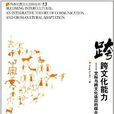《跨文化能力:交際與跨文化適應的綜合理論》是跨文化交際適應領域的一部理論力作,作者是美國俄克拉荷馬大學傳播學系教授Young Yun Kim(金榮淵)。她從全球化語境中文化交流的發展以及當下跨文化適應研究存在的不足人手,闡述構建綜合理論的必要性。她借鑑系統論的原理創建了自己的理論——交際與跨文化適應的綜合理論,對跨文化適應的六個關鍵層面作了深入的探討,最後闡述了該理論對跨文化實踐的啟示。《跨文化能力:交際與跨文化適應的綜合理論》架構清晰,層次分明,包含深刻的人文思想與豐富的理論觀點,具有很高的學術價值。
基本介紹
- 書名:跨文化能力:交際與跨文化適應的綜合理論
- 作者:金榮淵
- 出版日期:2014年4月1日
- 語種:簡體中文
- ISBN:9787544635639
- 外文名:Becoming Intercultural: An Integrative Theory of Communication and Cross-Cultural Adaptation
- 出版社:上海外語教育出版社
- 頁數:320頁
- 開本:16
- 品牌:上海外語教育出版社
內容簡介
圖書目錄
Preface
Part Ⅰ.The Background
1.Introduction
Common Experiences of Crossing Cultures
Theorizing About Cross—Cultural Adaptation
2.Existing Approaches to Cross—Cultural Adaptation
Macro—Level and Micro—Level Perspectives
Long—Term and Short—Term Adaptation
Adaptation as Problem and Adaptation as Learning)Growth
Varying Theoretical Accounts and EmpiricalAssessments
Divergent Value Premises: Assimilationism
and Pluralism
Toward Integrahon
Part Ⅱ.The Theory
3.Organizint; Prinaples
The Domain and Boundary Conditions
Assumptions: Strangers as Open Systems
Mechanics of Theorizing
Empirical Grounding
4.The Process of Cross—Cultural Adaptation
Cultural Adaptation
Cross—Cultural Adaptation
The Stress—Adaptation—Growth Dynamic: A Process Model
Three Facets of InteKultural Transformation
Axioms
5.The Structure of Cross—Cultural Adaptation
Personal Communication: Host CommunicationCompetence
Social Communication
Environment
Predisposition
Linki:ng Dimensions and Factors: A Structural Model
Assumptions, Axioms, and Theorems
Part Ⅲ.Elaboration of the Theory
6.PersonalCommunication
Host Communication Competence
Cognitive Components
Affective Components
Operational Components
Linking Cognitive, Affective, and Operational Components
7.Social Communication
Host Social Communication
Ethnic Social Communication
Linking Factors of Host and Ethnic SocialCommunication
8.Environment
Host Receptivity
Host Conformity Pressure
Ethnic Group Strength
Linking Factors of Communicahon and Environment
9.Predisposition
Preparedness for Change
Ethnic Proximity
Adaphve Perso:ality
Linking Factors of Communicahon and Predisposition
10.Intercultural Transformation
Functional Fitness
Psychological Health
Interculturalldenhty
Emergence of Intercultural Personhood
Part Ⅳ.The Theory and the Reality
11.Research Considerations
The Theory: Principal Features
Theory—Research Correspondence
Toward Methodological Integration
12.Practical Insights
Understanding Adaptation Potential
Host Environment as Partner
Willingness to Be Changed
Managing Stress
Focusing on Communicative Engagement
Cultivating Adaptive Personality
Forging a Path of Intercultural Personhood
Notes
References
Index
About the Author

